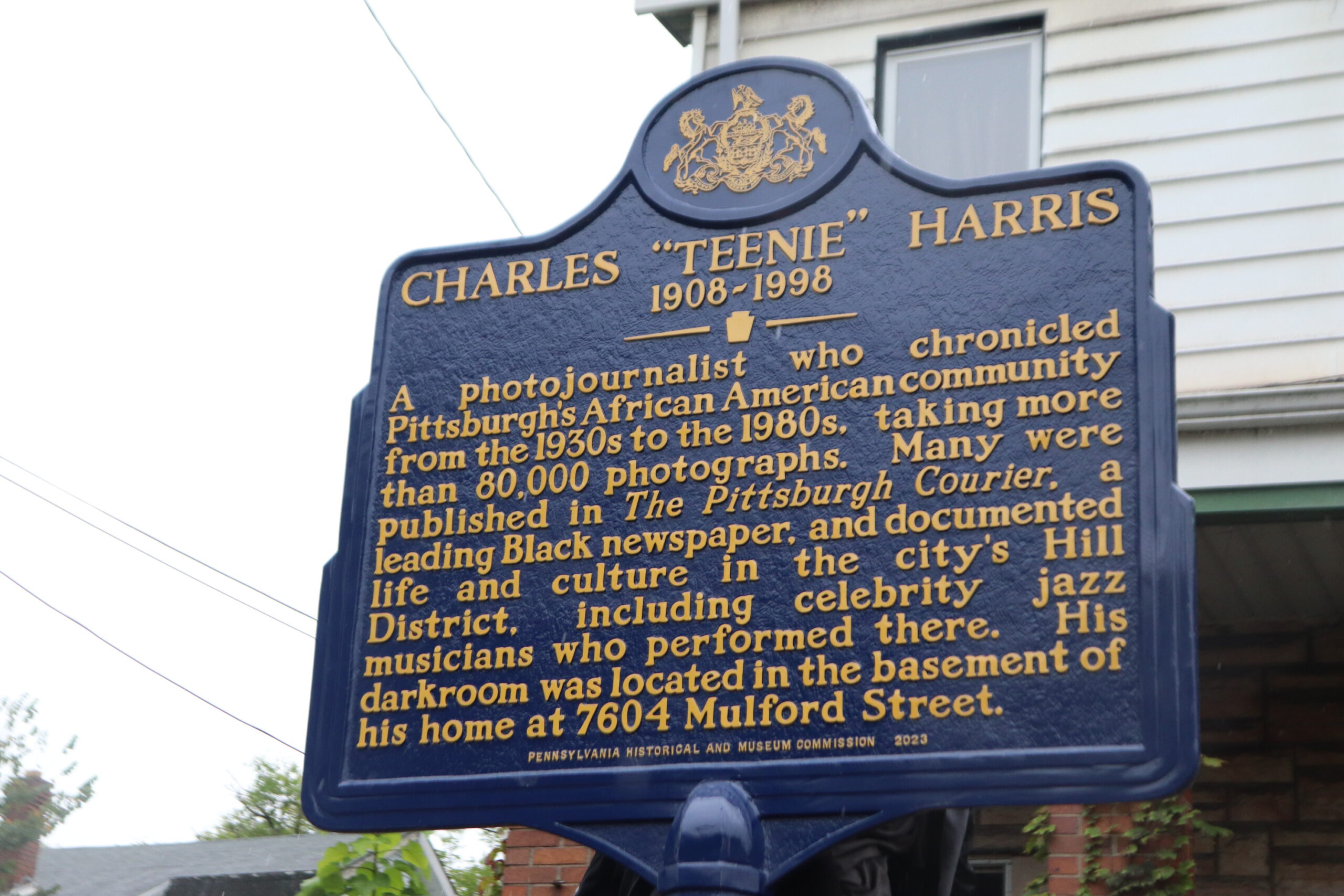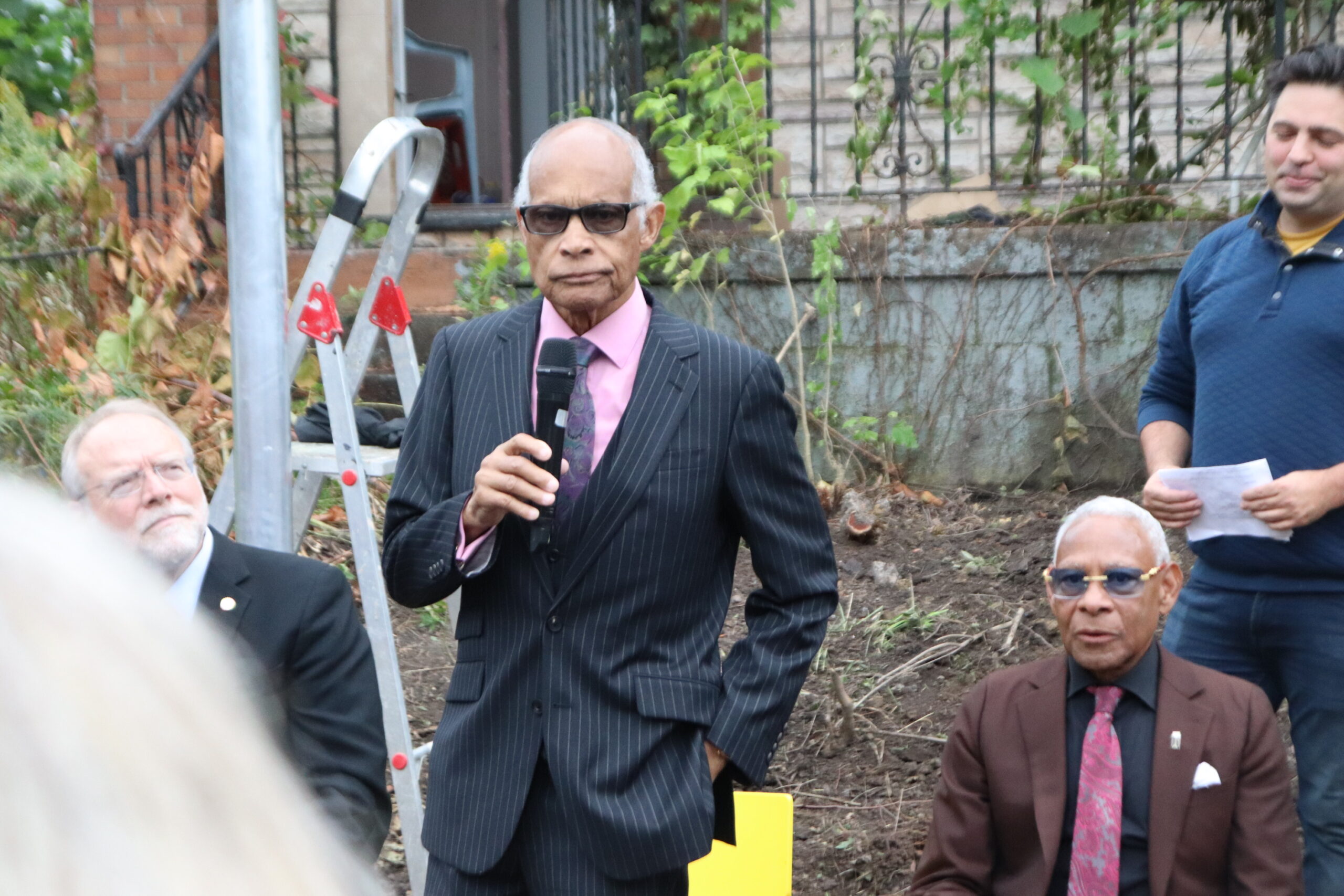FAMILY, FRIENDS, SUPPORTERS AND ELECTED OFFICIALS IN FRONT OF THE NEW CHARLES “TEENIE” HARRIS HISTORICAL MARKER. (PHOTOS BY ROB TAYLOR JR.)
One shot.
One shot was all Charles “Teenie” Harris needed to take.
He took more than 80,000 of them, over five decades, chronicling Black Pittsburgh like no one ever did, and ever will.
On Friday, Sept. 27, Harris’ legacy was further cemented—literally. A state historical marker was placed in front of Harris’ home, 7604 Mulford Street, in Homewood. No one lives in the home today, but for years, Harris would develop there the thousands of photographs that now tell the story of Black Pittsburgh from the 1930s to the early 1980s. The lifestyle of African Americans in the heart of the Hill District—whether it was the jazz clubs, the protests for civil rights, the art of the Black family, the celebrities, the politicians, the kids playing in the street, the numerous Black clubs and organizations — Harris developed many of them right there in the basement at 7604 Mulford.

TEENIE HARRIS’ grandchildren, Michele Cole and Lionel L. Harris Jr., stand in front of the new state historical marker for their grandfather, Friday, Sept. 27, in Homewood. (Photo by Rob Taylor Jr.)
The two-story home was where Harris and his wife, Elsa, raised their five children, like Lionel Harris, who was part of the festivities on a Friday afternoon, Sept. 27, that was proclaimed “Teenie Harris Day” in the City of Pittsburgh.

FAMILY MEMBERS AND FRIENDS OF TEENIE HARRIS, INCLUDING SON, LIONEL HARRIS, FAR LEFT, AND FORMER CO-WORKER, THADDEUS MOSLEY, FAR RIGHT.
“I’m 78 years old. I grew up in this house,” Lionel Harris said in front of about 100 people who stood in front of the home. “I used to slide down the banister pole to get from the second floor to the first floor.”
Lionel Harris recalled that when his father had to give up the studio space he had on Centre Avenue in the Hill, he brought the equipment into their home. “He had his enlarger, he had the items that would develop the film, and then he had a darkroom. All of that was in one line. I remember it so well because we used to show 16 millimeter films down here, sound films, and I used to charge…a few cents,” Harris said to some laughter. “It was wonderful because we all grew up here as a family, and we had a very close-knit family.”
Teenie Harris was born in 1908, and died in 1998. His work for the Courier spanned from 1936 to 1975, and you can’t find a Black person in town from that era who didn’t know Teenie Harris. Thaddeus Mosley, famed sculptor from the Pittsburgh region, spoke at the event about how when Mosley joined the Courier in the ’50s as a sportswriter, it was Harris who showed him the ins and outs of the Courier and Black Pittsburgh. But he also noted that the many books that have been published over the years that talk about Pittsburgh’s Black history, or Pittsburgh’s history in general, are spread worldwide—and some of the photos used in those books are Teenie Harris’ photos. Thus, Teenie Harris is an international figure.
“Images of people like Charlie Parker, Dizzy Gillespie, Lena Horne and John F. Kennedy and so forth,” Mosley said. “These pictures would have never been taken if it weren’t for Teenie.”
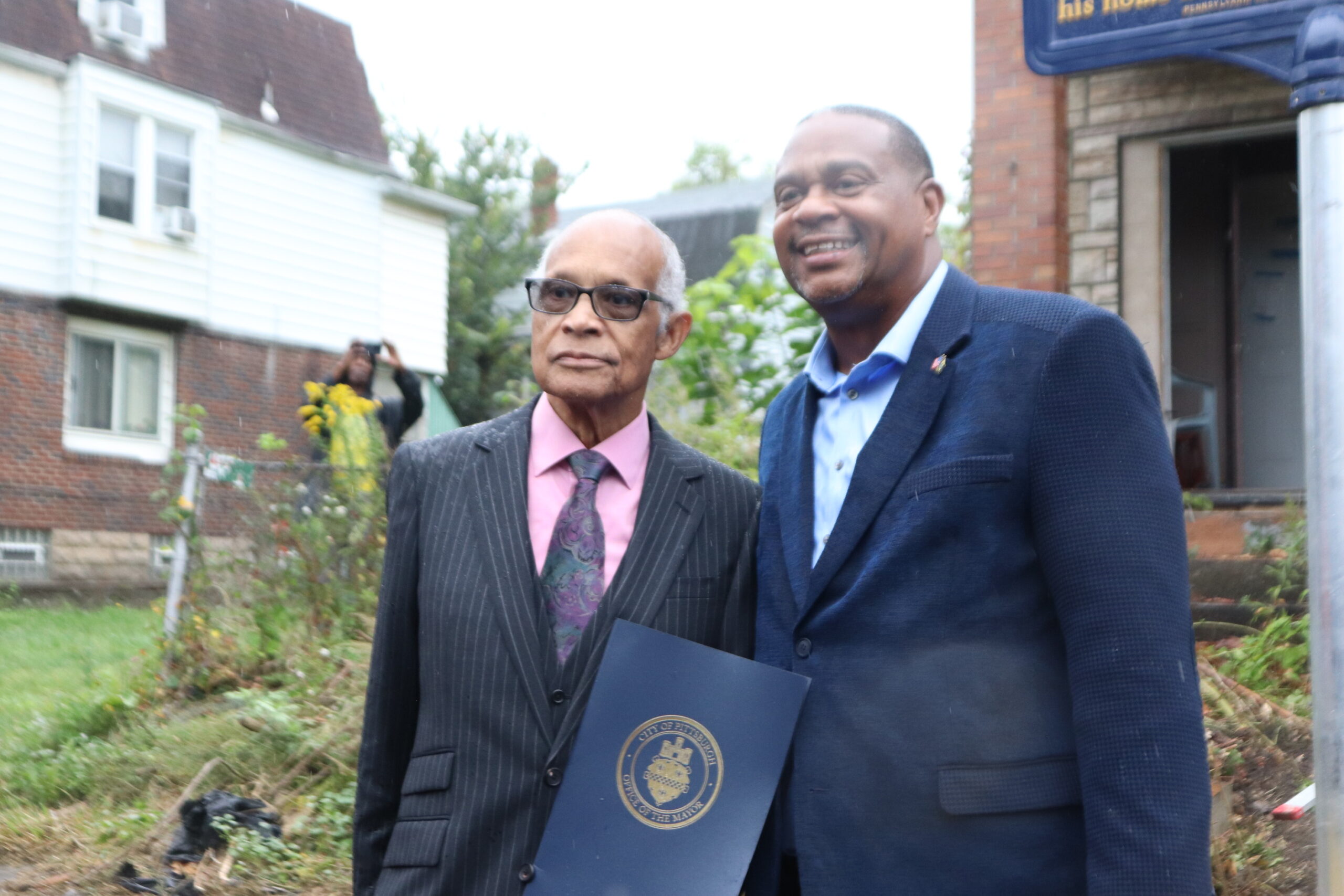
THE CITY PROCLAMATION—TEENIE HARRIS’ SON, LIONEL HARRIS, WITH MAYOR ED GAINEY.
Harris’ archive of photos is housed at the Carnegie Museum of Art. “If it weren’t for Teenie, (telling) a lot of our stories as African Americans would not have been possible,” said Charlene Foggie-Barnett, community archivist for the Harris archive at the Carnegie Museum.
Andy Masich, president and CEO of the Heinz History Center, said that the Pennsylvania Historical and Museum Commission has “2,600 markers covering the state. Those markers have to have regional or statewide or national significance, and I’m here to tell you that everyone at the Pennsylvania Historical and Museum Commission believes that Teenie Harris is of national significance.”
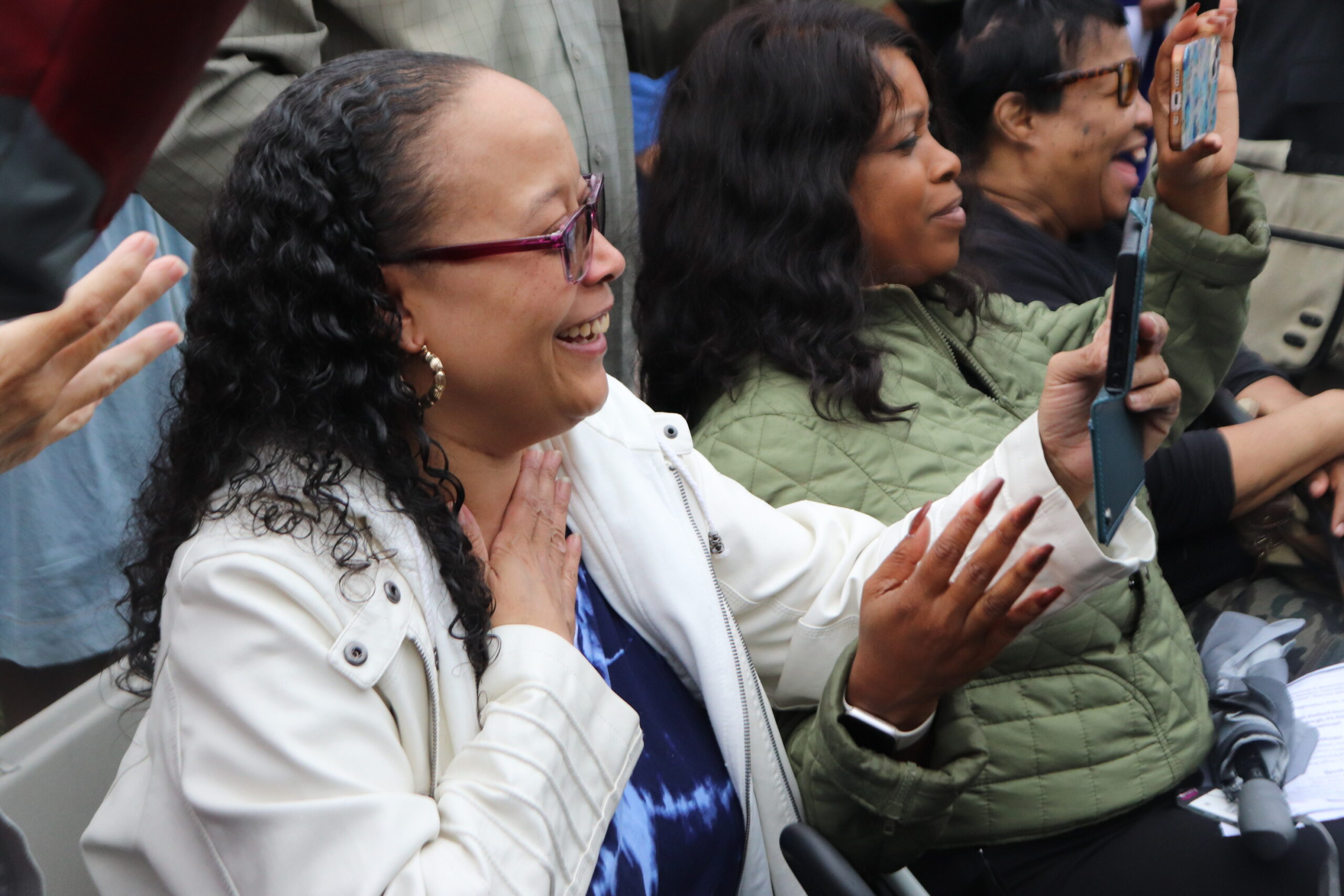
Pittsburgh Mayor Ed Gainey marveled at the fact that Teenie Harris created so many memories that will last lifetimes from the basement of a home in Homewood, a neighborhood where “they don’t talk about the superstars that came out of (it),” Mayor Gainey said. “I feel proud today. There’s certain things that I thought would never happen in this city, and it couldn’t (have happened) without the fathers that came before us and the mothers that came before us. And to be able to stand in front of his (Teenie’s) house” made the day all the more joyous, Mayor Gainey said.
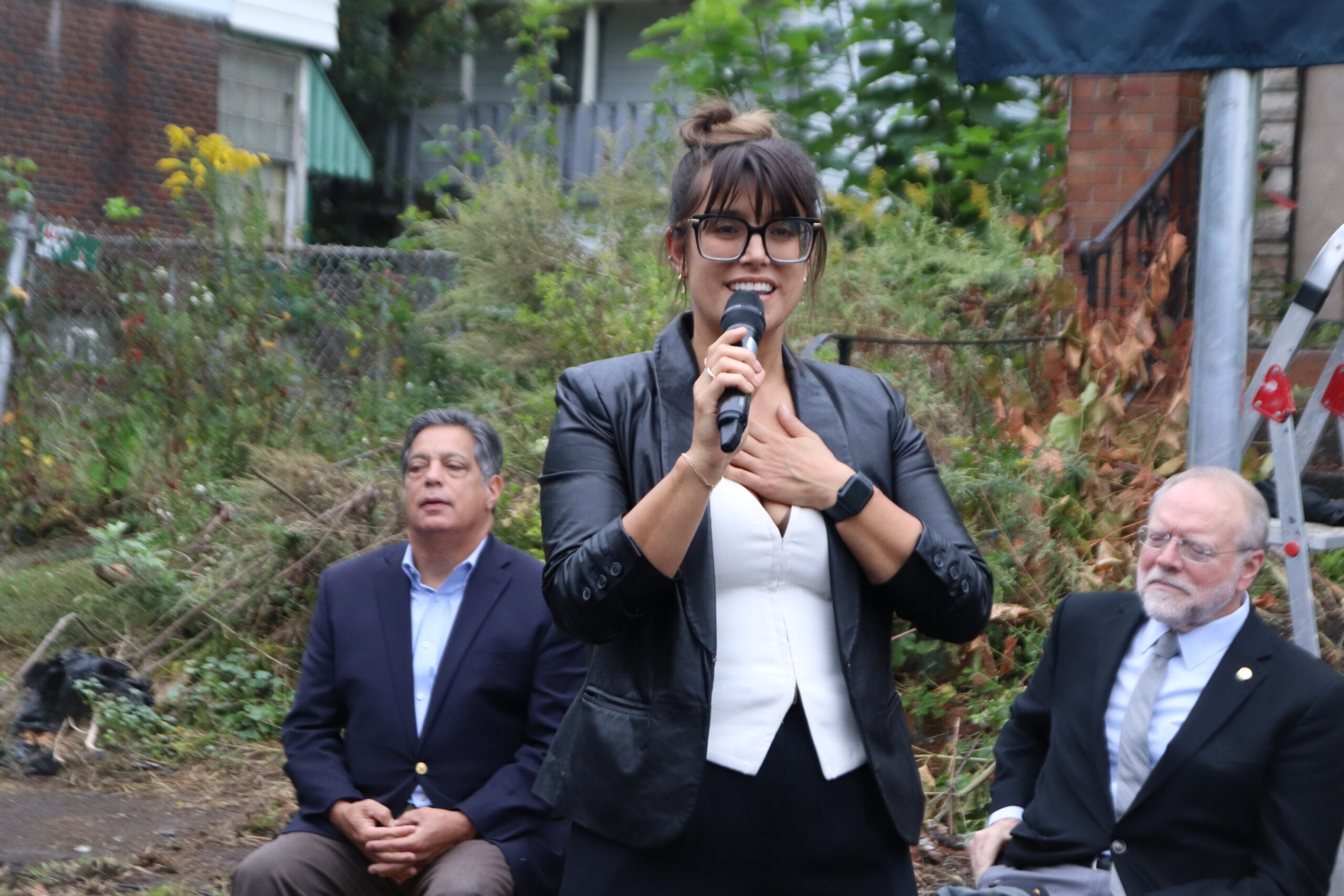
A few days before the celebration, leaders had learned that the home was going to be up for auction at a Sheriff’s sale beginning Oct. 7 for just under $50,000. The mayor wasn’t having any of that.

“We’re gonna save this house,” Mayor Gainey proclaimed, with elected officials to his side. “We’re gonna make this a monument to the history of Teenie Harris. And if the ‘community wills,’ to me it would be a blessing to call this, ‘Teenie Harris Street.'”
